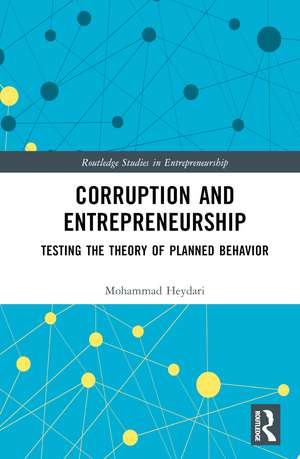Corruption and Entrepreneurship: Testing the Theory of Planned Behavior: Routledge Studies in Entrepreneurship
Autor Mohammad Heydarien Limba Engleză Hardback – apr 2024
Heydari argues that behavioral intentions are shaped by variables such as attitude, subjective norms and perceived behavioral control. He proposes the novel Heydari Behavioral Synthesis Theory (HBST) model and applies it to two case studies to highlight the institutional, individual and societal factors that may inhibit entrepreneurial behavior. He concludes that corruption may persist not just because of difficulties in monitoring and prosecuting, but because it is systemically pervasive and discourages individual countermeasures. He closes by looking at anti-corruption policies and outlining future research directions.
Arguing that widespread corruption may be theoretically mischaracterized in the literature, this book is of interest to policy-makers, researchers and postgraduate students in the fields of management science, industrial and organizational psychology, entrepreneurship and corruption studies.
Din seria Routledge Studies in Entrepreneurship
-
 Preț: 311.41 lei
Preț: 311.41 lei -
 Preț: 400.09 lei
Preț: 400.09 lei -
 Preț: 318.39 lei
Preț: 318.39 lei -
 Preț: 311.41 lei
Preț: 311.41 lei -
 Preț: 432.61 lei
Preț: 432.61 lei -
 Preț: 380.03 lei
Preț: 380.03 lei -
 Preț: 386.39 lei
Preț: 386.39 lei -
 Preț: 384.70 lei
Preț: 384.70 lei - 19%
 Preț: 258.06 lei
Preț: 258.06 lei - 16%
 Preț: 261.33 lei
Preț: 261.33 lei - 12%
 Preț: 299.67 lei
Preț: 299.67 lei - 18%
 Preț: 1000.27 lei
Preț: 1000.27 lei - 13%
 Preț: 295.74 lei
Preț: 295.74 lei -
 Preț: 380.63 lei
Preț: 380.63 lei - 18%
 Preț: 1109.18 lei
Preț: 1109.18 lei -
 Preț: 378.92 lei
Preț: 378.92 lei - 31%
 Preț: 764.22 lei
Preț: 764.22 lei - 25%
 Preț: 823.26 lei
Preț: 823.26 lei - 18%
 Preț: 1012.89 lei
Preț: 1012.89 lei -
 Preț: 368.98 lei
Preț: 368.98 lei -
 Preț: 423.95 lei
Preț: 423.95 lei - 12%
 Preț: 312.43 lei
Preț: 312.43 lei - 18%
 Preț: 1064.01 lei
Preț: 1064.01 lei -
 Preț: 382.86 lei
Preț: 382.86 lei - 18%
 Preț: 1062.31 lei
Preț: 1062.31 lei -
 Preț: 489.26 lei
Preț: 489.26 lei -
 Preț: 389.66 lei
Preț: 389.66 lei - 18%
 Preț: 1114.26 lei
Preț: 1114.26 lei - 18%
 Preț: 997.27 lei
Preț: 997.27 lei - 17%
 Preț: 256.87 lei
Preț: 256.87 lei - 9%
 Preț: 935.31 lei
Preț: 935.31 lei - 20%
 Preț: 261.33 lei
Preț: 261.33 lei - 26%
 Preț: 766.24 lei
Preț: 766.24 lei - 18%
 Preț: 1122.64 lei
Preț: 1122.64 lei
Preț: 1002.95 lei
Preț vechi: 1223.11 lei
-18% Nou
Puncte Express: 1504
Preț estimativ în valută:
191.96€ • 207.21$ • 160.96£
191.96€ • 207.21$ • 160.96£
Carte tipărită la comandă
Livrare economică 19 aprilie-03 mai
Preluare comenzi: 021 569.72.76
Specificații
ISBN-13: 9781032589961
ISBN-10: 1032589965
Pagini: 202
Ilustrații: 52
Dimensiuni: 156 x 234 x 13 mm
Greutate: 0.53 kg
Ediția:1
Editura: Taylor & Francis
Colecția Routledge
Seria Routledge Studies in Entrepreneurship
Locul publicării:Oxford, United Kingdom
ISBN-10: 1032589965
Pagini: 202
Ilustrații: 52
Dimensiuni: 156 x 234 x 13 mm
Greutate: 0.53 kg
Ediția:1
Editura: Taylor & Francis
Colecția Routledge
Seria Routledge Studies in Entrepreneurship
Locul publicării:Oxford, United Kingdom
Public țintă
PostgraduateCuprins
1. Introduction to the Theory of Planned Behavior 2. Methodology 3. From Intention to Action: Application of the Theory to a Case Study 4. Moderators in the Theory of Planned Behavior 5. Greasing or Sanding the Wheels? 6. Corruption as a Collective Behavior 7. Corruption as a Collective Action Problem and Policy Implications 8. Extension and Empowerment of the Theory
Notă biografică
Mohammad Heydari, School of Economics and Management, Tongji University, Shanghai, China.
Descriere
This book examines corruption as a collective behaviour problem for entrepreneurs. In particular, it considers the Azjen’s theory of planned behaviour (TPB) to explain perceived corruption and its effects on entrepreneurship.
